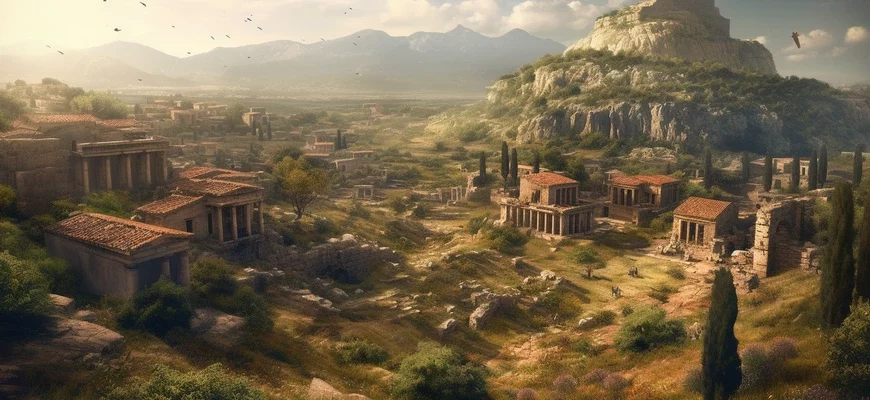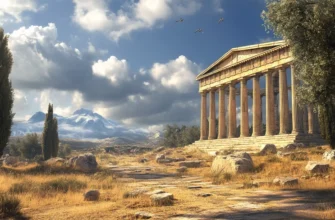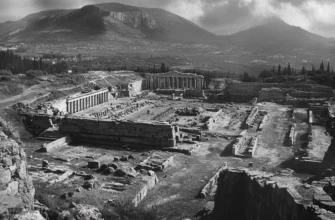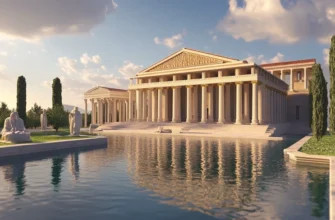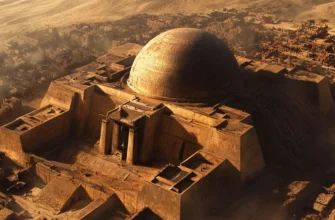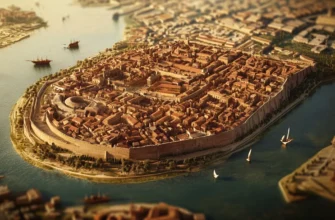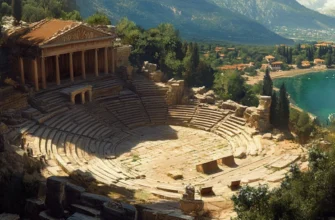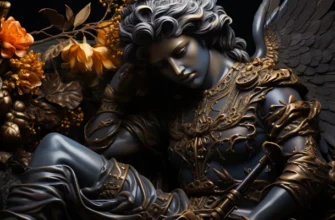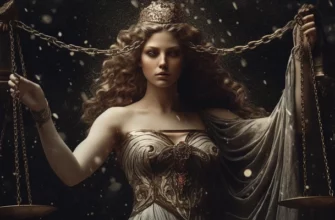Ancient Sparta was a Greek city-state founded in the 9th century BC in the southwestern part of the Peloponnese peninsula. Sparta was known for its military spirit, discipline, and military achievements. It was one of the most powerful states in Ancient Greece.
The history of Sparta begins with references in ancient poems and legends that link it to the country of Laconia and the heroes Menelaus and Helen. In the middle of the 8th century BC, Sparta was conquered by the Dorians, who became its main ethnic group. From that moment on, Sparta became a separate political and cultural center that developed relatively independently from other Greek city-states.
Sparta was a strong military state in which military service was considered the duty of every citizen. From birth, men underwent rigorous military training and physical training. From a young age, boys lived in combat units and spent most of their time doing physical exercises. The Spartan military was formed as a result of reforms carried out by the legendary ruler Lycurgus, who introduced a system of military training where military service became the main purpose of life.
In addition to its military spirit, Sparta was known for its laws and culture. Spartan law was extremely strict and based on conservative traditions and strict moral principles. For example, engaged couples had to live separately until their wedding, and men had the right to have several wives. Sparta also practiced ephoria, the annual election of five members of the ephorate, who controlled the activities of the rulers and military commanders.
The culture of Sparta was different from other Greek city-states. For example, there were no theaters in Sparta, and music and dance were restricted. Instead, the main forms of entertainment were sports competitions and military parades. In Sparta, physical strength and military qualities were valued, so the Spartans did not emphasize art and intellectual development.
In the 4th century BC, Sparta lost its power in Greece due to its defeat by Athens in the Peloponnesian War. After that, Sparta lost its military and political power, but the culture and traditions of Sparta live on as an example of military discipline and moral values.
Early settlements and early period
Sparta was founded by Dorian settlers in the southwestern Peloponnese around 1000 BC. In the early periods of its existence, Sparta was a small settlement with significant territorial problems.
However, over time, Sparta grew into a powerful city-state thanks to its military might and strategic location. In particular, Sparta was located on the route from Messenia to Corinth, which allowed the city to control trade and the movement of troops in this direction.
According to legend, the founder of Sparta was Lacedaemon, who was believed to be a descendant of the god Zeus. The first settlers who arrived in this area were Dorian tribes who migrated from western Greece.
In its early period, Sparta was a monarchy, but over time, power passed to a council of elders called the Gerousia. Alongside the Gerousia, there was the Apella, or popular assembly, which made decisions on important matters concerning the city-state.
In its early period, Sparta was a military state where the warrior class was the main element of culture and social hierarchy. Spartan warriors were the most privileged group in society and had the right to participate in decision-making at the level of the Gerousia and the Apella.
Religion in early Sparta was associated with the cult of Zeus and other Greek gods and goddesses. Sparta also had a cult of Heracles, whom the Spartans considered their ancestor. In addition, Sparta had a system of hero cults associated with local myths and legends.
In the early period of Sparta, there was also a system of economic agreements between the Spartans and the Messenians, another Greek tribe that inhabited the neighboring territories. These agreements provided the Spartans with access to resources and trade, as well as helping to ensure the military power of the city-state.
In the early period of Sparta, there was also an education and training system aimed at preparing young men for military service. This system included physical training, military training, as well as education in music, poetry, and philosophy.
During this period, Sparta also played an important role in the Greek world as one of the leading centers of military and political power. In the 6th century BC, as a result of the war with Messenia, Sparta became even more powerful, occupying significant territories and subjugating the Messenians.
Subsequently, Sparta became one of the leading states of Greek antiquity, known for its military might and unique culture.
Sparta during the Hellenistic period and the Roman Empire
During the Hellenistic period (4th–1st centuries BC), Sparta lost its role as the leading state of Greece. From that time on, the city played a secondary role in the political and cultural life of Greece. Sparta remained a military power but had no greater political influence.
In the Roman Empire (1st–5th centuries AD), Sparta was a privileged locality, part of the province of Achaea, and retained its status as an independent city-state. Roman emperors did not interfere in the internal affairs of Sparta, and the city preserved its traditions and rituals.
In the 3rd century AD, the city was destroyed during the invasion of the Goths, and in the middle of the 4th century AD, it was captured and destroyed by the Roman emperor Theodosius I. From that time on, Sparta lost its role and status as a state. In the middle of the 5th century AD, the city was incorporated into the Byzantine Empire and retained its importance as a place of historical significance and tourist attraction. In the Middle Ages, Sparta remained a provincial town, and in the 19th century, it became part of independent Greece.
Sparta in the Middle Ages and Modern Times
Sparta did not play a significant role in medieval history. During the Byzantine Empire, the city was part of the province of Morea and played a secondary role in the administrative-territorial division.
During the Ottoman Empire (15th–19th centuries), Sparta became part of the Peloponnese province. The Ottoman rulers preserved local traditions and customs, but Islamic culture also influenced the city. In the 18th century, a mosque was founded, indicating the growth of the Muslim population in the city.
In the 19th century, Greece declared independence from the Ottoman Empire. Sparta became part of the newly formed state and received the status of a provincial city. In the 20th century, the city underwent significant changes: the population grew, new neighborhoods and industrial enterprises were built. However, the city has preserved its historic center and many monuments associated with the Spartan state.
Today, Sparta is one of the most famous tourist destinations in Greece, thanks to its ancient history and cultural heritage. The city has an archaeological museum, a folklore museum, the Cathedral of Saint Demetrius, and other attractions. Sparta is also known for its sporting events, which are held annually as part of the international festival “Spartan Games.”
Culture of Sparta
Sparta, one of the most famous cities in Greece, was renowned for its military strength and unshakable principles. The culture of Sparta was extremely different from that of other Greek city-states. It was characterized by extreme pragmatism and conservatism, which was reflected in all aspects of Spartan life.
The Spartans believed that their city was founded by the god Apollo and honored him throughout their lives. However, their main god, Ares, was the god of war, which meant that war was the most important thing in the life of the Spartans.
One of the most famous features of Spartan culture is their military organization. They had one of the strongest and best-trained armies in the world at that time. From birth to death, Spartan men were subjected to military training and drills, which ensured the high efficiency of their military operations.
The Spartans did not allow their women to participate in military activities, but they were recognized as some of the most influential women in ancient Greece. Women in Sparta enjoyed a significant amount of freedom that was not found in any other city. They could participate in sports, own property, engage in business, and even influence political decisions.
Spartan culture also differed from that of other Greek cities in its system of education. From birth, Spartan children were educated in special state schools, where they learned military skills and gained knowledge about Spartan culture and traditions. This system of education ensured high discipline and order in the city.
One of the interesting aspects of Spartan culture is their democracy. Although Sparta is often associated with military dictatorship, it had a form of democracy where decisions were made collectively and without the participation of the people. At the same time, the distribution of power in Sparta was extremely uneven, with a large share of power in the hands of a few elite families.
Spartan culture differed from that of other Greek cities in its religious beliefs. The Spartans were devotees of ancient rituals and traditions, which they considered sacred. One of Sparta’s most famous festivals, the Carneian Games, was dedicated to the god Apollo and was of great importance to the Spartan people.
Spartan culture also differed in its artistic and architectural heritage. The Spartan style of architecture was known for its simplicity and conciseness, as well as its extensive use of stone. Spartan pottery and sculpture were also known for their simple forms and lack of intricate ornamentation.
Thus, the culture of Sparta was extremely different from that of other Greek cities, which made it unique and interesting to study. Although Sparta suffered a series of defeats and disappeared as a result of the collapse of the Roman Empire, its culture remains known throughout the world and continues to inspire us today.
Unfortunately, the history of Sparta was recorded mainly by its enemies, which has left insufficient sources to understand the details and essence of Spartan culture. However, historians and archaeologists continue to study the remains of Spartan architecture, pottery, art, and other artifacts to learn more about this fascinating culture.
In general, the culture of Sparta is proof that even the greatest nations and empires can disappear, but their legacy and contribution to history remain unforgettable. Sparta, like Greek culture as a whole, has become a great spiritual legacy for our world, from which we can learn and improve our knowledge and understanding of humanity’s past and present.
The social structure of Sparta
Sparta was a state with a complex social structure that allowed it to maintain discipline and strength. In this structure, people were divided into classes, each with its own duties and rights.
The first class was the “Spartans,” who numbered about 9,000. These were Spartan citizens who were descendants of the original conquerors of Laconia. They were the military elite and had all political rights in the state. Spartans could hold government positions, wage war, and rule the state. They also had the right to land ownership, which they received from the state, and could only marry other Spartans.
The second class was the “perioeci,” who numbered about 22,000. They were independent merchants, artisans, and farmers who lived within the Spartan territory but were not Spartans. They were full citizens of Sparta but had no political power. The perioeci could engage in commerce and crafts, as well as serve in the state army. They helped maintain the state’s economy and complemented Sparta’s military power.
The third class was the helots, who numbered about 150,000. Helots were slaves who were conquered during wars and considered the property of the Spartans. They could perform any work required of them by the Spartans, including work in the fields and military expeditions. Helots had no rights
Helots had no rights to land ownership and could not marry other Spartans. They were also restricted in their rights to religious ceremonies and participated in cruel exercises to ensure the strength of the state.
The social structure of Sparta was aimed at preserving power and controlling citizens. Spartans received the best education and military training to ensure the strength of the state and its defense against enemies. The Perioeci lived outside the city and had no influence on state decisions, but were important to the economy of Sparta. The helots were the lowest class and were completely dependent on the Spartans.
The Spartan social structure was quite stable and remained intact for many centuries. Sparta successfully used its social structure to ensure its strength and maintained its independence for quite a long time. However, the social inequality that existed in Sparta can be seen as one of the reasons for the fall of the state.
The influence of Sparta on the development of ancient Greece
Sparta had a significant influence on the development of ancient Greece, which was evident in many aspects of life.
Sparta’s military prowess and strict military discipline were an example to other Greek city-states. In ancient times, Sparta was the strongest military power in Greece, and its methods of military training were copied by other city-states. Many Greek warriors who took part in the Battle of Thermopylae were trained according to Spartan methods.
Sparta’s cultural influence was also significant. The Spartans were known for their ascetic culture and simple way of life. They believed that culture should be aimed at raising strong and disciplined citizens. This became an example for other Greek city-states, which also sought to raise strong and disciplined citizens.
Sparta’s political experience was also important for other Greek city-states. Sparta was one of the few Greek city-states where power was concentrated in the hands of a limited group of people. This became an example for other Greek city-states, which also tried to keep power in the hands of a limited group of people.
However, Sparta also had a negative impact on the development of Greece. In addition, the Spartan social structure, with its military aristocracy and prohibition of trade and crafts, limited Sparta’s economic development and restricted cultural exchange with other Greek city-states.
In addition, Sparta was known for its cruelty and bloodthirstiness, especially during wars with other Greek city-states. For example, during the Messenian War (743-724 BC), Sparta was accused of destroying the city of Messenia, killing its inhabitants, and violating human dignity.
In later historical periods, Sparta lost its influence, but the legacy it left behind remained important for the development of ancient Greece. Sparta became a symbol of a powerful state and military discipline, which remained an example for other Greek city-states. The culture and craftsmanship of Sparta influenced the formation of Greek armor and warfare strategies. In addition, many of Sparta’s core ideas, such as the importance of discipline and the arrival of troops, remain important concepts in modern military science.
In conclusion, Sparta had a significant influence on the development of ancient Greece, which manifested itself in military prowess, cultural influence, and political experience. Its methods of military training, ascetic culture, and strict military discipline became an example for other Greek city-states.
Military power and role in the Persian Wars
Sparta, founded on military aristocracy and military discipline, became one of the most influential states in Greece in the 5th century BC. Thanks to its discipline and efficient organization, Sparta became one of the leading states of Greece, playing an important role in the Persian Wars.
In the first Persian War (492-490 BC), when the Persian king Darius I invaded the territory of the Greek city-states, Sparta did not take part in the Battle of Marathon. However, in the Second Persian War (480-479 BC), when the Persian king Xerxes I invaded Greece with a large army and fleet, Sparta became one of the leading states in the war.
When Athens refused to join the war against the Persians, Sparta took on the role of the leading state in the anti-Persian alliance and became the main organizer of the coalition. The Spartans sent their best warriors, the hoplites, to the Battle of Thermopylae, where they inflicted heavy losses on the Persian army advancing southward in Greece. Sparta participated in the Battle of Salamis with a small squadron, but its troops helped defeat the Persian fleet.
Ultimately, the Persian Wars ended with the victory of the Greeks and the preservation of their independence. Sparta also played an important role in the post-war period, when it participated in the creation of the Delian League, an alliance of Greek city-states formed to defend against Persian aggression. However, Sparta was dissatisfied with Athens’ use of the alliance to strengthen its power and influence over other city-states. This led to the outbreak of conflict between Athens and Sparta, which escalated into the Peloponnesian War (431-404 BC).
In this war, Sparta, once again using its military forces, played a major role in the defeat of Athens and its power. After the war, Sparta joined an alliance called the Peloponnesian League and became one of the leading powers in the Greek world. However, over time, Sparta’s power began to decline due to internal conflicts, economic instability, and an overly strict social structure. In 371 BC, Sparta was defeated in the Battle of Leuctra by Thebes and Boeotia, which led to a decline in Sparta’s influence in Greece.
In later periods, Sparta continued to play an important role in Greek history, but it was more of a secondary power. Nevertheless, the military spirit and discipline of Sparta remained important elements of Greek culture and influenced the formation of future Greek military powers, such as Macedonia and the Seleucid Empire.
Overall, Sparta remains an important part of Greek and ancient world history. Its military traditions and culture influenced many other Greek states and the history of Europe itself. Although Sparta was founded over 2,500 years ago and endured many trials, it remains one of the most mysterious states of antiquity.
Conclusions
Ancient Sparta was an unusual state that differed from other Greek states in its political system, social structure, and military traditions. Despite its small territory and population, Sparta became one of the most famous and powerful states of antiquity.
Sparta was a state in which political power was held by only two kings, who were advisors to the Spartan Council and the Gerousia. At the same time, Sparta was also a police state, where military discipline and patriotism were highly valued. This allowed Sparta to win many wars and defend its independence from numerous enemies.
The social structure of Sparta was also different from other states of antiquity, where there were clearly defined classes of people. In Sparta, there were three social classes: Spartans, Perioeci, and Helots. Only Spartans had full political and social freedom, but their rights were limited by military duties.
Finally, Sparta had a significant influence on the history of Greece and the ancient world. The military traditions of Sparta influenced many other Greek states and the history of Europe itself. Sparta also played an important role in the Persian Wars, where its military capabilities helped stop the Persian Empire’s attacks on Greece.
In conclusion, Sparta is a state that remains an important part of the history of Greece and the ancient world. Its influence on the politics, culture, and military affairs of ancient Greece was undeniable, and it remains one of the most interesting historical states of antiquity.
Overall, Sparta is an important element in the history of Greece and the ancient world as a whole. Its influence on culture, politics, and military affairs has long been recognized and studied by historians. However, its history is also an example of how a strong focus on one aspect can lead to a lack of development in other areas.
